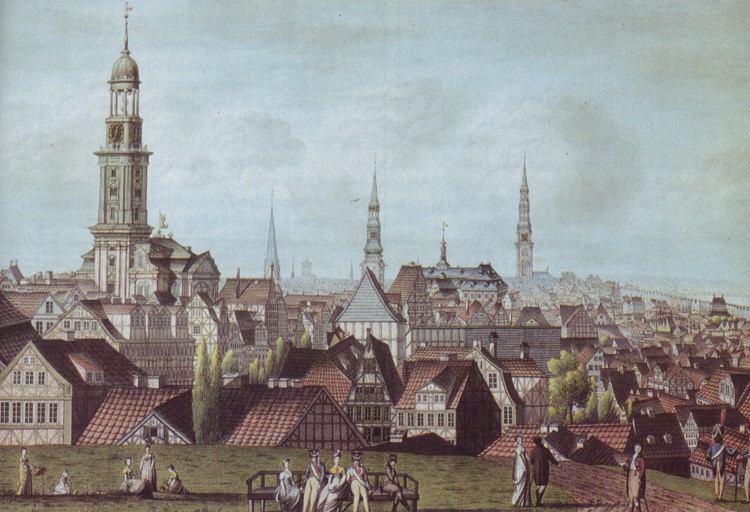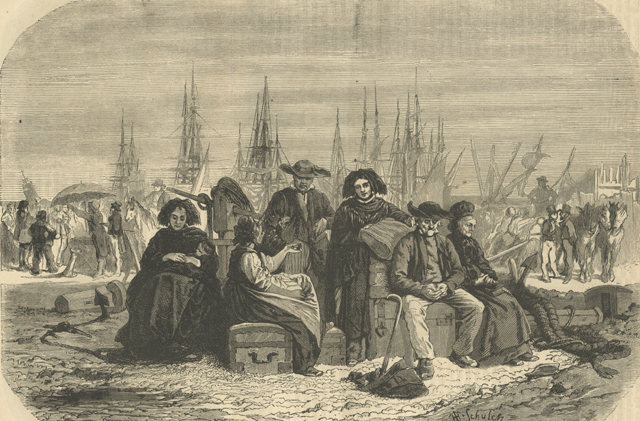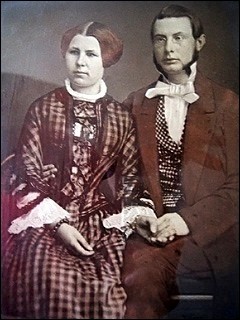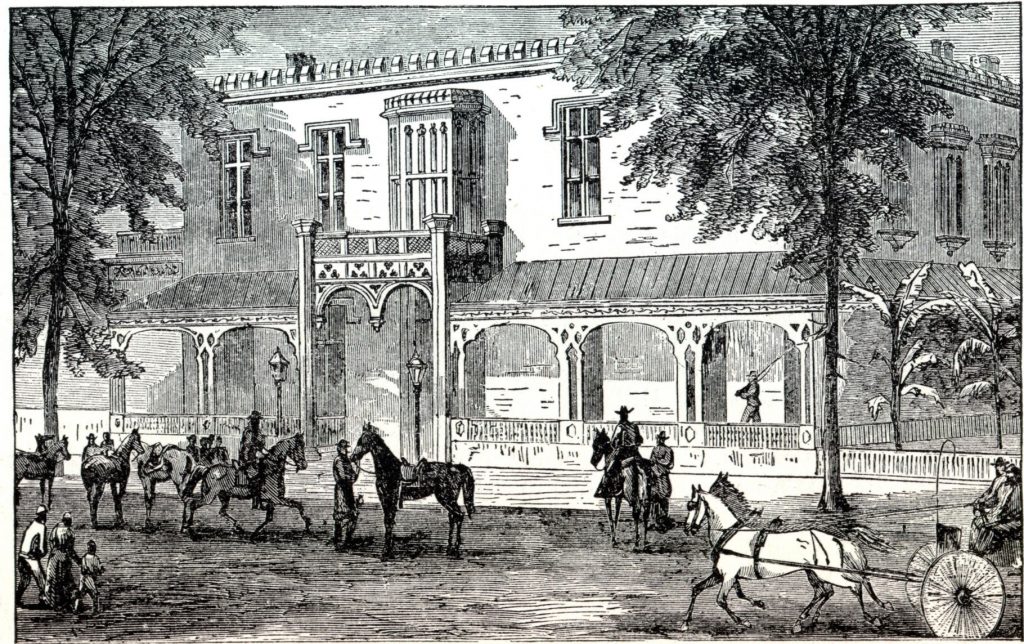To Savannah and Back
Johannes Nicolaus Hudtwalcker, b. in Hamburg on 5 April 1830 – d. in Hamburg on 27 September 1873, was the 7th child and 2nd son to Martin Hieronymus Hudtwalcker,b. in Hamburg on 15 September 1787 – d. in Hamburg on 16 August 1865, in his marriage with Charlotte Amalia von Mengeshausen, b. Göttingen on 27 December 1796 – d. in Hamburg on 15 September 1870.
According to Ernst Samhaber, Hamburg in the middle of the eighteenth century still smelled of herring and blubber, of Icelandic cod and dried plaice. The merchants were little more than hucksters who got their fish from Holland and resold it by the quarter-ton, the half-ton, and perhaps occasionally by the ton, to the small shopkeepers in the provinces of Lauenburg and Mecklenburg. The business was profitable enough, provided a man worked hard and lived modestly. Only a few Hamburg merchants then imported their merchandise from far-off countries.

If a man could have his adolescent son apprenticed to a craftsman or a merchant, he would be safe for five years. He would get his bed and board, he would be clothed, and if he should fall ill, his employer’s family or servants would look after him. He was thus relieved of all anxiety. On the other hand, he could buy next to nothing during those years; – for he was given no cash. If the employer’s wife was stingy, then he would go hungry. To buy additional food, say a loaf of white bread or a stick of candy sugar, was a dream only rarely realized.

The year he turned 19, on 22 April 1849, a young Johannes Nicolaus Hudtwalcker left the herring-smelling Old World behind and embarked for North America. With a ticket for a first class cabin at hand, he went on board the Russian ship ”Herrmann” bound for New York. In North America he became a merchant in Savannah, Georgia. Here he soon positioned himself in a leading role in the flourishing lumber trade, doing business with the Caribbean Islands. In 1855 he became the Merchant-Consul for Hamburg in Savannah, and in 1861 Consul for Prussia.

The US Census of 1860, City of Savannah, Georgia, shows him as Nicholas Hoodwalker, 30 years old, merchant from Hamburg, living with his wife Anna Adeline, 24 years old of Bremen, Germany, and his 3 year old son Nicholas, born in Savannah in 1857. They shared a house with two other merchants: Christian Weber of Hannover, Germany, and Christian Holst of Denmark, both being 35 years old at that time.

Georgia was the leading lumber producing state in the antebellum South. Savannah, its chief seaport, was also one of the busiest lumber market in the United States, and instrumental in providing a valuable product which attracted respectable amount of trade with England and Europe. The town had been founded in 1733 by the British General James Oglethorpe as a defensive site on a high bluff above the river of the same name. For fifty years it served at the capital of Georgia, the thirteenth and last of Britain’s North American colonies. From the beginning the river was Savannah’s commercial artery, and the town was Georgia’s major port.
Savannah was ethnically and religiously cosmopolitan and diverse almost from the beginning. By the mid-1730s there was a babble of languages spoken among the five hundred residents, including English, German, French, Spanish., and various African and Native American dialects. And by 1800, Savannah, with a population of some five thousand, evenly divided between blacks and whites, was the fourteenth largest city in the United States. During the American Revolution the town was heavily damaged, and when it was over, the capital of the state of Georgia was moved upcountry, where the population was growing more rapidly. However, the new jobs created by the establishment of the Central of Georgia Railroad, which by the 1840s dominated rail traffic in the southeast, together with the burgeoning steamship lines carrying goods into and out of the port, led to economic expansion. The population of Savannah doubled between 1840 and 1860, which made Savannah the sixth largest city in the Old South. The American Civil War was a disaster for Savannah in terms of property and human losses.
During the American Civil War (1861 – 1865), and Johannes Nicolaus Hudtwalcker’s tenure as Prussian (German) Consul in Savannah, the following has been documented:
”In 1862 several hundred aliens, in order to avoid conscription, presented affidavits to the clerk of the Inferior Court at Savannah, saying that they did not intend to become citizens of the Confederate States. The Prussian consul at Savannah, J.N. Hudtwalcker, wrote Governor Brown in March, 1862, that ”several subjects of the German states in Savannah were drafted
after taking an oath of non-intension to become citizens of this country.” and asked that they be released. Adjutant-General Wayne ordered the men to be released immediately.”

”Wayne, Henry Constantine (1815-1853); letters, 1860-1862; 10 items. Includes note from Wayne (Milledgeville, Georgia) to General M.C.M. Hammond, [date missing]; letter from John McIntosh Kell (Darien, Georgia) to Wayne, concerning his commission in the Navy of the State of Georgia, April 6, 1861; 8 letters written between Wayne, J.N. Hudtwalcker (Prussian Consulate in Savannah), and Georgia Governor Joseph E. Brown in March 1862, concerning the drafting of men under the protection of the Prussian consulate in Savannah.”
Sherman’s Headquarters, Savannah, December 1864
After the American Civil War, Johannes Nicolaus Hudtwalcker returned to Hamburg. He died 43 years old in Hamburg on 27 September 1873.
Parents
Martin Hieronymus Hudtwalcker, b. in Hamburg on 15 September 1787 – d. in Hamburg on 16 August 1865
Charlotte Amalie von Mengeshausen, b. in Göttingen on 27 December 1796 – d. in Hamburg on 15 September 1870
Siblings
Marie Charlotte Hudtwalcker 1818-
Eduard. Nikolaus Hudtwalcker 1820-1821
Ida Amalia Hudtwalcker 1822-1871
Auguste Caroline Hudtwalcker 1824-
Julie Nicoline Hudtwalcker 1825-
Adelheid Dorothea Hudtwalcker 1828-1829
Johannes Nicolaus Hudtwalcker 1830-1873
Martin Carl Robert Hudtwalcker 1832-1834
Johannes Friedrich Hudtwalcker 1834-1863
Carl Bernhard Hudtwalcker 1836-1902. Married 9 January 1868 to Karoline Theodore Friederike Franziska Eggers 1840-
Charlotte Amalie Friederike Hudtwalcker 1838-
Johanna Elisabeth Hudtwalcker 1839-
Spouse
Anna Adeline Sengstake, b. in Bremen on 10 April 1834
Children
Nicolaus Christian Hudtwalcker (born in Savannah in 1857 – year and place of death: unknown).
Dorothea Charlotte Hudtwalcker (born in Savannah 1872 – Basel 1910)
Nicolaus Christian was a merchant in Valparaiso, Chile. In 1883 he married Feliza Carlotta Rogers. She was a daughter of Stephen Rogers, and granddaughter of Samuel Frost Haviland, an American who founded the first mining bank in Chile, which also issued the first Chilean bank notes. The couple had three daughters:
Adela Carlota Hudtwalcker (Valparaiso 1884)
Feliza Ana Hudtwalcker (Valparaiso 1886 – Hamburg 1889)
Ana Kerima Hudtwalcker (Valparaiso 1888)
Sources
Ernst Samhaber: Merchants Make History: How Trade Has Influenced the Course of History Throughout the World, John Day Co., 1964
Andrea Mehrländer: … überall hiest man fahnen, Die Maus, Gesellschaft für Familienforschung e.V. Bremen, Germany
John A. Eisterhold: Savannah: Lumber Center of The South Atlantic, The Georgia Historical Quarterly, Vol. 57, No. 4, Winter, 1973
Walter J. Fraser: Savannah in the Old South, University of Georgia Press
Thomas Conn Bryan: Confederate Georgia, The University of Georgia Press, 1953
Civil War collection, 1860-1865, Emory University, Manuscript, Archives, and Rare Book Library Atlanta, GA 30322
Links
http://chab-belgium.com/pdf/english/Economist.pdf
hudtwalcker.com/out-of-hamburg/
www.hudtwalcker.com 2019
